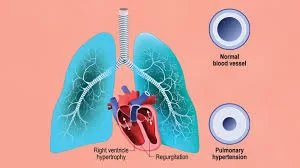New Delhi: A pioneering team of scientists from Sir Ganga Ram Hospital has made a groundbreaking discovery in the fight against pulmonary arterial hypertension (PAH), a severe and often fatal lung condition. The researchers, led by Dr. Rashmi Rana from the Department of Biotechnology and Research, have identified four previously overlooked genes that could revolutionize the treatment and diagnosis of PAH.
PAH is characterized by elevated blood pressure in the arteries of the lungs, leading to heart failure and reduced oxygen levels in the bloodstream. The newly identified genes – SNORD3D, HLA-AS1, EGR1, and NPM1 – are consistently less active in patients suffering from this condition.
“This discovery marks a crucial step forward in comprehending the underlying biological mechanisms of the disease,” Dr. Rana and her team told IANS on Monday. Their findings, published in the prestigious journal Respiratory Medicine, shed light on the molecular pathways involved in PAH, offering promising new avenues for treatment.
Dr. Rana emphasized the potential impact of this research, stating, “Our study provides new insights into the molecular pathways involved in PAH. By focusing on these less active genes, we can explore targeted approaches to treatment and develop diagnostic tools that are more precise and effective.”
Currently, PAH is notoriously difficult to diagnose and manage due to the lack of specific and reliable diagnostic methods. The condition often remains undetected until it has reached an advanced stage, making effective intervention challenging. Existing treatments primarily manage symptoms rather than addressing the root causes of the disease.
The breakthrough research holds significant promise for future treatments. By targeting the newly identified genes, researchers and pharmaceutical companies can develop therapies that address the underlying genetic issues of PAH, potentially leading to more effective and personalized treatments.
Moreover, the discovery could pave the way for innovative diagnostic tests that identify PAH earlier and more accurately. “Personalized medicine, which tailors treatments to individual genetic profiles, could soon become a reality for PAH patients. This progress brings renewed hope for improved outcomes and quality of life for those affected by this challenging condition,” Dr. Rana’s team highlighted.
The identification of these genes is a major advancement in the understanding of PAH and could transform the landscape of treatment and diagnosis. With continued research and collaboration, this discovery could significantly enhance the quality of life for PAH patients, offering them new hope for a healthier future.












